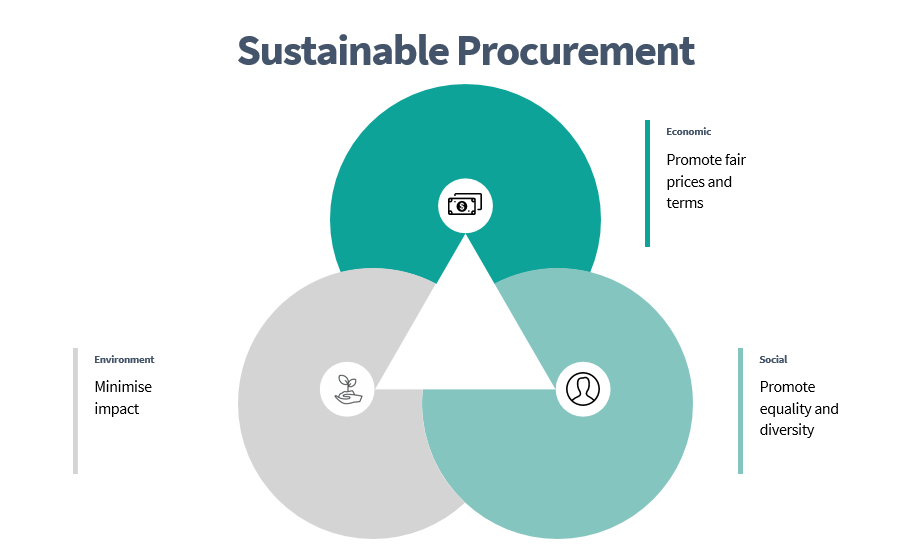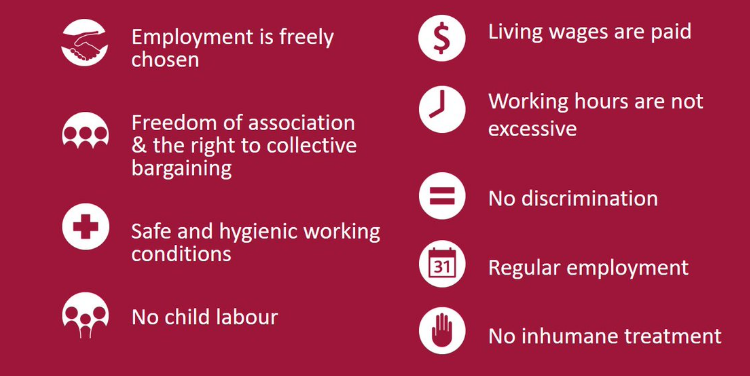How Value is released through Responsible Procurement

Responsible Procurement, Environmental Procurement, Affirmative Procurement, Green Procurement……heard any of these? Well, they are all alternative names or derivatives of Sustainable Procurement.
Sustainable Procurement is an approach to Procurement that considers Economic, Environmental and Social Sustainability with the aim of:
• Minimising negative impacts of goods/services throughout their lifecycle and supply chain
• Minimising demand for non-renewable resources
• Promoting equality and diversity throughout supply chains
• Ensuring fair contract prices and terms are applied throughout supply chains
These four areas are also suggested by the British Standards Institution Sustainable Procurement guide.

Procurement have a challenging job to meet the needs of their stakeholder needs, ensuring compliance with Corporate Social Responsibility (CSR) whilst also maintaining or enhancing economic security of organisations. That is, in addition to convincing their organisation why it is important to balance the three perspectives, and that it can be achieved without too many compromises.
Procurement release economic value
Procurement release economic value by securing value for money, this is an opportunity often missed. Sometimes its not about buying the cheapest but buying the product or service that has a longer lifecycle, or one that adds additional value. For instance, a Housing Association I work with are very proud to say that part of their procurement strategy is based on encouraging young people into the workplace. This meant that on some occasions they paid slightly more for their service, but that supplier took on a continuous stream of apprentices and/or young workers hence securing a sustainable service for the future, reducing their risk by securing supply.
Procurement can also add economic value by implementing an effective investment appraisal process for capital purchases to consider the whole life consumptions costs, environmental and disposal costs. Managing budgets and cash flow for a business is important for an organisations sustainability. It is not always the best decision to pay less and pay up front, nor is it healthy for supplier relationships to have ridiculously long payment terms. Procurement should consider the business strategy and the vulnerabilities in their supply chains before making these decisions. Of course, this leads quite nicely onto Ethical Trading; using the Ethical Trading Initiative as a base code for procurement; member organisations agree to follow principles such as communicating, implementing and enforcing standards within supply chains.

Source: http//ETI.org
Procurement can promote this by embedding into the Procurement Cycle, from creating the specification, to sourcing the market, to developing contract terms, supplier appraisal and selection, pricing, payment, and performance management. Managing these issues sensibly and fairly is key to ensuring sustainable supply whilst continuously improving standards. Sustainable markets and supply chains are essential for long term growth.
Simple measures procurement can take include improving relationships with suppliers, sharing forecast and business strategy to assist their suppliers to align. This helps by having no surprises and reduces the impact of “urgent” orders. Having clear sustainable lead-times and payment terms in place enables suppliers to plan efficiently and effectively and when they have a forecast which offers stability resulting in raising standards and encouraging fair pay to employees.
Offering suppliers a sustainable price will ensure suppliers grow, improve working conditions, human and labour rights and encourages innovation for sustainable supply. In addition, it ensures business viability, providing stable employment and job creation.
Procurement release environmental value
Procurement release environmental value through designing green products and services, sourcing green, reducing waste throughout the procurement cycle, considering logistics to minimise pollution, GHG emissions and environmental impacts. Procurement should also consider mitigating exploitation or damage to scarce and non-renewable resources, consider climate change, work with supply chains to ensure there is adequate capability to comply with environmental standards. Acting as an intermediary between suppliers and product development and design departments to encourage knowledge sharing, research, and innovation for greener product specifications.
Procurement should consider resource consumption; its not always possible to eradicate non-renewable resource consumption but procurement could focus their efforts on developing alternatives before resources are depleted. Renewable resources consider harvesting at a sustainable rate and not exceeding the rate of replenishment, for instance changing the type of fish used in fish fingers.
Procurement release social value
Procurement release social value by encouraging diversity in procurement and among suppliers, monitoring supplier practices and encouraging improved standards, considering health and safety of products and services, community benefits, increasing fair and ethical trade and buying from local and small businesses. Procurement can also support skill development and fair employment practices through their fair and ethical sourcing processes.
The main social and cultural issues in supply chains are inequality of works, health and safety standards, wages, labour standards, forced working, language and cultural barriers. Many organisations believe that these factors do not affect them as their supply chains are in the UK. Well, they are wrong, a lot of poor practice is happening around the UK and Europe, procurement would not be doing their due diligence if they did not consider this. Procurement need to be sensible here, different approaches are required for different supply chains.
Steps procurement can take include understanding language issues, seeking feedback and checking understanding, learning about cross-cultural issues, getting to know suppliers, promoting minimum ethical and sustainable standards, supporting providers, requesting subscription to the code of ethics, implemening a code of conduct for suppliers.
Procurement could investigate and encourage equal opportunities, consider potential risk and vulnerabilities of groups and communities, take positive action. Encourage and support those suppliers making effective changes to working conditions, pay, and health and safety.
Rewards of sustainability
Rewards of sustainability can be enough to encourage businesses to become responsible; from increasing your organisational competitive advantage, increasing commitment from your supply chain to ensuring control and success, reducing vulnerability and increasing stakeholder trust.
Ultimately, sustainability requires a sound business case, it drives the need for more efficient goods and processes, encourages procurement to evaluate cost performance and value over the life of contracts whilst eliminating waste in supply chains. Sustainability encourages the need for job creation, new markets, and supports innovation.
Encouraging sustainable procurement is much more than including standards and codes of practice such as:
• Labour codes – ILO, ETI, AETI, SA8000, Fair Trade
• Environment – ISO14001, ISO14023/5 Ecolabels, EMAS
• Social – Fairtrade & WFTO, FLO
Ineffective use of codes, standards and organisations could be counterproductive and have negative implications on supply chains. Implementing sustainable procurement to encourage sustainable supply chains must include a mixture of hard and soft factors.

This article was written by Susan Rashid FCIPS, MBA, CPSM, PGCE, Founder & Managing Director of SR Supply Chain Consultants and Co Founder of SR Strategic Sourcing.
For further details and information on Saving money through effective Procurement and how this can help your organisation please contact us or click through to the following pages:
Managing and Mitigating Risk in your Supply Chain
Preventing Modern Day Slavery in your Supply Chain
Preventing Modern Day Slavery in your Supply Chain – Public Sector
